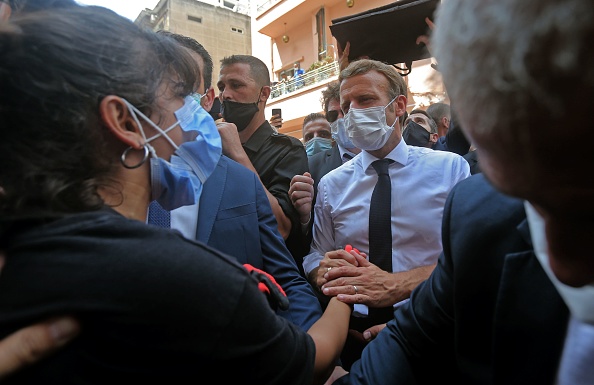The explosion comes in the wake of an alarming deterioration of the economy hyperinflation, collapsing political framework, rapidly rising poverty which is forcing some to eat at best every other day, mass unemployment, inconsistent essential services such as water and sanitation and limited electricity with widespread blackouts up to 22 hours a day caused by a fuel shortage – a culmination of decades of corruption and greed by a political class that pillaged nearly every sector of the economy.
Two weeks ago — well before the explosion at Beirut’s port — the Washington Post described the worsening situation in Lebanon: “Bread, a staple of the Lebanese diet, is in short supply because the government can’t fund imports of wheat. Essential medicines are disappearing from pharmacies. Hospitals are laying off staff because the government isn’t paying its portion, and cancelling surgeries because they don’t have electricity or the fuel to operate generators. Newly impoverished people are taking to Facebook to offer to trade household items for milk. Crime is on the rise. In one widely circulated video, a man wearing a coronavirus mask and wielding a pistol holds up a drugstore and demands that the pharmacist hand over diapers.”
Just last week, analysis from Save the Children suggested that close to a million people can no longer afford basic necessities in the Beirut area, pushing more than 560,000 children to the brink of hunger. This figure could escalate in the coming weeks- Lebanon imports some 90 per cent of the wheat used to bake staple flatbreads, but some 80 per cent of this haul enters and is held at the now decimated port in Beirut, and according to UNICEF, almost 80,000 children are among the 300,000 people displaced by the Beirut explosions, with affected families in desperate need of support.
Add to all this a deadly pandemic with cases anticipated to surge in the coming weeks and overwhelm its battered healthcare system after the explosion destroyed medical supply depots at the port, as well four key hospitals. At the same time, two other facilities sustained substantial damage, and the equivalent of 500 hospital beds have been lost. Meanwhile, according to the Office for the Coordination of Humanitarian Affairs, medical facilities in Beirut remain inundated with trauma and burn victims, with many providing treatment on sidewalks and in carparks. And many intensive care units were already near capacity with COVID-19 patients, and the nation’s outbreak worsens.
The security situation in the country is also fragile with regular terror attacks and exchanges of fire between it and neighbouring Israel. The Syrian conflict has also sporadically spilled over into Lebanon, with several attacks affecting Beirut and nearby regions. Writing in Washington-based The Hill newspaper, Mona Yaacoubian, senior adviser to the vice president for Middle East and Africa at the U.S. Institute of Peace, said a total meltdown in Lebanon could also provoke new refugee flows to Europe and add yet more turmoil to the arc of instability stretching from Syria through Iraq, with negative implications for U.S. allies in the region.
What’s worse, about 20 percent of Lebanon’s 7 million population are refugees, with most coming from Syria to flee the fighting. They are likely be among the hardest hit as they had few means to begin with.
The country has drifted along, miraculously avoiding collapse for years but today Lebanon is facing a nightmare scenario reminiscent of the protracted Lebanese civil war from which it may take decades to recover and many worry about a decline so steep it would alter the country’s identity forever.

“DON’T GIVE AID MONEY TO OUR GOVERNMENT”
Before the disaster in Beirut, traditional friends of Lebanon were no longer willing to help bailout country so steeped in corruption, particularly after the state defaulted on its debt in April. Moreover, Gulf Arab states who once helped have baulked at bailing out a nation that is increasingly influenced by Iran and Hezbollah. Beirut has appealed to international creditors like the International Monetary Fund (IMF) for a whopping $10 billion in financial assistance, but the IMF has refused to play ball unless the Lebanese government reforms its bloated, inefficient, and corrupt public sector. So far, Beirut's power brokers have resisted.
While financial lifelines are one thing, humanitarian aid is another. As crisis that has unfolded in Beirut in the last 24 hours, international offers of medical and other immediate aid have poured in. But now the Lebanese have a request for the world: Please don’t give aid money to our government.
That was evident during French President Emmanuel Macron’s visit to Beirut on Thursday where he said he would organize an international conference to raise funds for Lebanon, but he warned Lebanese leaders that they would not be getting “blank checks,” adding that financial help for Beirut should go directly to aid groups and those who need it. As he offered words of condolence and support, some pleaded he keep Lebanon’s government out of any recovery efforts.
It seems many countries are abiding by the request to avoid the government. For example, Canada say they're sending cash to "trusted" humanitarian organizations like the Lebanese Red Cross, in what appears to be an oblique acknowledgement of the corruption of would-be "official" aid recipients of the state. Australia pledged $1.4 million to the United Nations’ World Food Program and the Lebanese Red Cross, and others, like France, Germany, and Russia, are sending search-and-rescue and medical teams to assist civil society groups.









